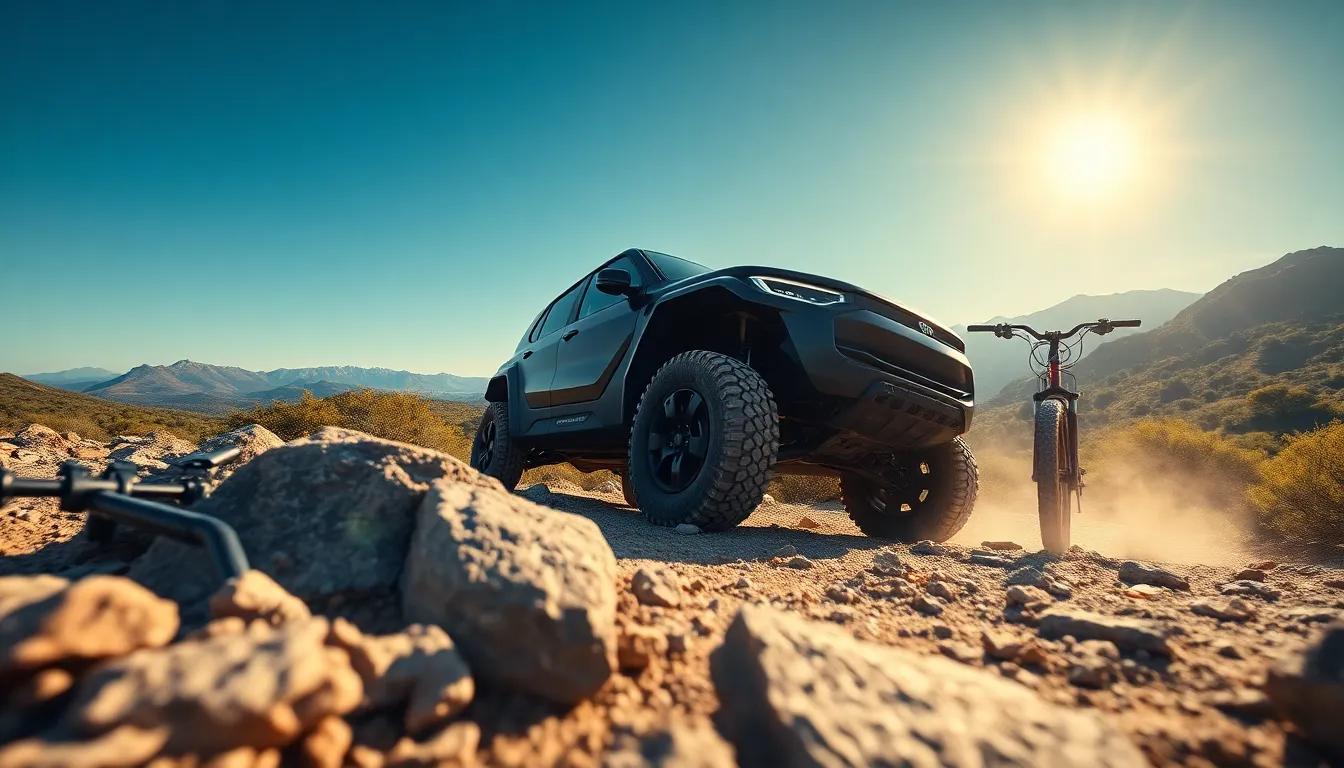Picture this: a rugged trail, a breathtaking landscape, and an all-electric vehicle humming quietly as it glides over rocks and roots. You might think, “Heads up, the future is here.” Yes, electric off road vehicles are not just a trend: they’ve become a pulse of adventure in the automotive world. Gone are the days of loud engines and gas-guzzling beasts. Welcome the era where performance meets sustainability, and your only worry is whether to take the scenic route or just crush it on the toughest trails. Get ready for an electrifying journey into the world of off-roading.
Table of Contents
ToggleWhat Are Electric Off Road Vehicles?

Electric off road vehicles (EORVs) are just what they sound like, vehicles designed for off-road adventures powered entirely by electricity. Think of them as the superhero version of traditional off-roaders. They come equipped with advanced electric drivetrains, allowing them to tackle rough terrains without the roar of a combustion engine. Even in the muddiest of situations, these electric marvels keep you moving forward, smoothly and quietly. They often feature robust designs that enhance durability and off-road ability, making them ideal for off-grid escapades.
Benefits of Electric Off Road Vehicles
Why should anyone consider electric off road vehicles? Several outstanding benefits make them appealing not just to enthusiasts but also to eco-conscious adventurers.
- Eco-Friendly: They emit zero tailpipe emissions, significantly reducing your carbon footprint while you explore.
- Operating Costs: Electric vehicles are cheaper to run in terms of maintenance and energy consumption compared to traditional gas-powered vehicles. Charging costs are generally lower than gas prices.
- Torque and Performance: Electric motors provide instant torque, translating to quick acceleration and impressive climbing capabilities.
- Quiet Operation: The near-silent running greatly enhances the experience of nature, allowing for a more immersive adventure. Who wouldn’t want to hear birds and babbling brooks rather than engine roars?
- Reduced Maintenance: With fewer moving parts, they usually require less maintenance compared to their gas counterparts.
Types of Electric Off Road Vehicles
There’s no one-size-fits-all when it comes to electric off road vehicles. Here’s a look at some popular types:
Electric ATVs
These all-terrain vehicles are compact and agile. Perfect for quick trips or traversing tricky landscapes, electric ATVs make off-roading accessible and fun.
Electric UTVs
Utility Task Vehicles (UTVs) are larger than ATVs and often carry more passengers or cargo. They provide comfort and versatility for group adventures.
Electric Bicycles
Now, many assume the electric bicycle might not fit the off-road category, but imagine traversing rugged hills effortlessly. Electric mountain bikes are gaining popularity among adventure seekers.
Electric Trucks
Some manufacturers have made strides in producing electric trucks capable of handling heavy-duty tasks and rugged terrains. These blends of utility and sustainability are transforming the market.
Key Features to Consider
When considering an electric off road vehicle, several key features should guide the decision:
- Battery Life: Longer battery life ensures extended adventures without frequent recharges.
- Range: The distance the vehicle can travel on a single charge is crucial, especially in remote areas.
- Power and Torque: Look for models with ample power and torque to conquer steep trails effortlessly.
- Durability: Off-road vehicles must withstand rough handling, diverse weather, and rugged terrains. Think about materials and build quality.
- Charging Options: Check whether there are charging stations available along your predicted routes or how easy it is to charge at home.
Popular Models and Brands
A myriad of brands has jumped onto the electric off road vehicle bandwagon. Here are a few noteworthy models:
- Rivian R1T: This electric truck can take you from the road to rugged paths seamlessly, boasting exceptional off-road capability and impressive range.
- Tesla Cybertruck: While still generating buzz, this outlandish electric vehicle promises durability and off-road functionality, coupled with unparalleled range and tech features.
- Polaris Ranger EV: A compact electric UTV that’s perfect for work or play. Its quiet operation and spacious cargo area make it ideal for a variety of tasks.
- Can-Am Maverick X3: Though it’s traditionally a gas model, an electric version is on the horizon, teasing users with its potential off-road prowess.
The Environmental Impact
The push for electric off road vehicles is primarily driven by their environmental benefits. These vehicles contribute to a reduction in greenhouse gas emissions, which is a critical factor for preserving our beloved planet. As off-roading increases in popularity, it’s crucial to adopt sustainable practices. The electric models not only minimize pollution but also lower noise levels, enhancing ecosystems and wildlife experiences.
Also, with advancements in battery recycling technology, the used batteries from electric vehicles can be repurposed, further minimizing environmental impact through responsible management.
Challenges and Limitations
Even though the numerous benefits, electric off road vehicles face some challenges:
- Charging Infrastructure: Limited charging stations in remote areas can pose challenges for long trips.
- Battery Weight: Electric batteries can be heavy, impacting the vehicle’s overall weight. This could affect performance and maneuverability.
- Cost: The initial investment can be higher than traditional vehicles, largely due to the technology and materials involved in building electric models.
- Range Anxiety: For off-road trips, concerns about running out of battery can hinder adventurous spirits.



